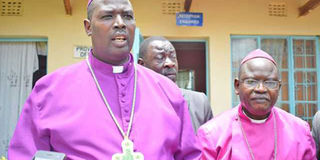Breaking News: At least 10 feared to have drowned in Makueni river
ACK bishops elect new Dean as bid to change constitution gathers pace

Anglican Church of Kenya Archbishop Jackson Ole Sapit at a past event. The ACK Synod has elected Meru Bishop Charles Mwendwa as new Provincial Dean to replace Bishop Joseph Wasonga (right) who retired on September 1. PHOTO | FILE | NATION MEDIA GROUP
What you need to know:
Bishop Mwendwa was picked during the Synod sittings, which started on Wednesday and ended the next day at the All Saints Cathedral, the church’s seat of power. The Synod meets every two years
He will act as the Archbishop when the latter is absent from the Church or is incapacitated by any cause.
Meru Bishop Charles Mwendwa is the new Provincial Dean for the Anglican Church of Kenya (ACK).
The change of guard has been occasioned by the retirement of Maseno West Bishop Joseph Wasonga, the previous holder, on September 1. Bishop Wasonga has since been replaced by his former diocesan Secretary, John Mark Haung Godia.
CHURCH CONSTITUTION
Bishop Mwendwa was picked during the Synod sittings, which started on Wednesday and ended the next day at the All Saints Cathedral, the church’s seat of power. The Synod meets every two years.
The post is the second most powerful after that of the ACK Archbishop.
At the same time, a push to amend the Church’s Constitution has gathered momentum after the bishops sent a number of proposals to the dioceses for debate and eventual ratification.
“In order to respond to the ever-changing needs and operational environment and remain true to our mandate in a holistic manner, we commit to re-examine our constitution, processes and the way we do business guided by ACK Decade Strategy 2018-2027. In this regard, this session resolved that where Dioceses have in place Human Resources Policies and Procedure Manuals, such documents should be harmonised with the Provincial Human Resource Manual within a grace period of one year,” Archbishop Jackson Ole Sapit said in a communication.
ELECTION DISPUTES
“One of the areas we want to look at is having the elections three months after the bishop retires to avoid the influence of the incumbency,” a high-ranking official from the archbishop’s office said.
Given the high number of post-election disputes that have flooded the courts in the past four years, the bishops are keen to create a conflict resolution organ to lead arbitrations going forward.
“Some of the issues can be sorted out administratively without having the aggrieved go to the secular courts. The absence of such an organ has meant that every slight dispute after the elections finds its way to the courts to the detriment of the Church’s image,” Bishop David Kodia of Bondo Diocese, a member of the constitution amendment committee, told the Sunday Nation yesterday.
Equally, there is a strong desire to increase the eligibility age for one to vie, from 35 to 45 years.
“Many people are not comfortable with the current arrangement. They say that when one is elected at 35, it means the faithful will have to contend with him or her for 30 years when they retire. Their concern is that if the leader has glaring shortcomings, then putting them through such is not healthy for the church,” Prof Kodia said.
WOMEN CONSECRATION
Increasing the age to 45 means that the maximum period a prelate can serve is 20 years since they retire at 65.
On the stubborn question of women bishops, the church is also effecting a deliberate push to encourage senior female priests to vie whenever a vacancy arises.
“Right now, the Constitution just talks of priests of good standing being allowed to run in bishopric elections. We want to take this a notch further and affirm the consecration of women to become bishops in the revised document,” Bishop Kodia said.
The Anglican Constitution explains that a Provincial Dean is a sitting bishop elected by the Standing Committee of the Provincial Synod from a list of Bishops recommended by the House of Bishops. He acts as the Archbishop when the latter is absent from the Church or is incapacitated by any cause.
Given that he is the longest serving prelate after Bishop Wasonga left the service, the synod settled on Bishop Mwendwa through consensus. The Diocese of Meru was carved from the Diocese of Kirinyaga in 1997.
WATER TOWERS
The committee has also been charged with coming up with a guideline on setting up of new dioceses to guard against possible ‘mushrooming’ of such units in future. In May, Garissa Diocese became one of the newest units, bringing the number of religious divisions to 40, with Bishop David Mutisya at the helm.
At a time the government is leading a crackdown on those who encroached into the Mau forest, the church also weighed in on the raging debate on saving water towers.
“The session noted with deep concern the devastating effects of climate change on general welfare of Kenyans. We call upon the government, county governments and others to step up efforts in combating the effects.
“To this end, we resolve to scale up our efforts through tree planting and growing, promotion of green energy within our areas of influence and waste management as well as champion policies and reforms in various sectors,” Archbishop Sapit said.





